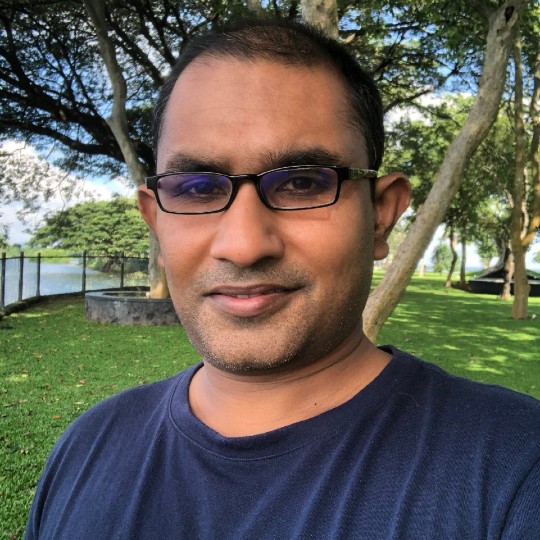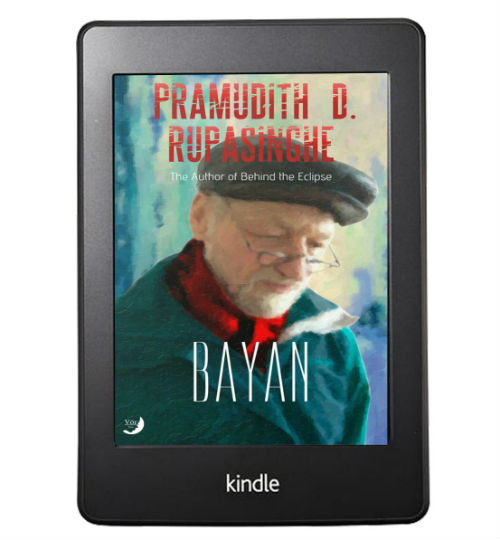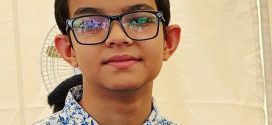Books are definitely our best friends. While we love reading thrillers, fiction, mythology oriented and inspirational books; we love exploring realistic meaningful read as well. In one such fortunate incident, we came to know about “Bayan” – a book by Pramudith Rupasinghe. The author is already popular in a circle and this is not his first book. But, this is the first one by him we came to know about. And, we find ourselves really fortunate to read it.
You can find our unbiased views for the book at:
The way the book is written shows how well read the author himself is. The way he has explored human psyche, political scenarios and elements of nature; makes you adore him. It made us curious to know more about the author and his books. And, what could have been a better alternative than having an author interview with him?
Fortunately, we were able to have a small Q/A session with him. I am delighted to share it with you all, here we go.

Pramudith D. Rupasinghe – the author of – Bayan
This Is Here In For You
We are glad to have a conversation with you. Thank you for sparing some time to have a Q/A session with us. Your book “Bayan” is getting positive responses in both commercial and critical aspects, like your previous books. Please accept our congratulations for the same. It is a nice book indeed. Please accept our congratulations for the same and tell us something about it (the response to the book).
In terms of the reach out, dynamics of popularity and the life of a piece of writing differ from one to another. When compared with my previous books, especially Behind the Eclipse what took the world’s attention immediately, I anticipated a slower but a steady Journey from Bayan as it is not a fast and easy read, and it is appealing to a specific group of readers who can reflect and absorb a philosophy heavy fiction.
As I thought, it took more than two years for Bayan to reach the world, first among my English readership around the world, then through translations. So far Bayan has been translated into Polish, Sinhala, German, and Burmese. And French, Russian and Hindi translations will be hopeful out in the market from mid-2021.
So far I have received very positive responses around the world, and the book has paced up since the beginning of 2020, after 18 months of the release of the English edition.
It is also a wonder that a lot of quotes from Bayan are now on different quote sites, and Facebook page of the book itself has reached over 8.5k followers and a lot of daily interactions. And I believe the book is still, even after 2 years, on an onward and upward joinery around the world, reaching not only English readership but also people who read in other languages.
It is a kind of cliché question, obviously, you are feeling joyous, accomplished and happy. Each time we are able to follow our passions the way we want to and getting a positive response on the course, we feel, inching more towards completeness. Do you think so?
Yes. I think it is a common and natural human reaction. When your reward centers are stimulated, it is very normal to be motivated and inching toward the completeness.
Can you tell us more about yourself, your background, your profession, and your passions?
I have been working as a humanitarian diplomat for more than 17 years in different parts of the world, working in both natural disaster and conflict contexts, including Global Ebola Response in West Africa. However, I started my writing career
in 2016, very recently- almost 5 years ago. I have been writing a lot of unpublished stuff before early 2016. In 2016, I published my debut semi-fiction “Footprints in Obscurity”- 15 chapters of the book encapsulated stories about 29 countries out of 54 in the African continent. In the same year, November I published “Behind the Eclipse”, a story set in 3 West African Countries – Liberia, Guinea and Sierra Leon, ( that was the epicenter of the West African Ebola Crisis). Upon publishing “Behind the Eclipse” I started getting more and more international attention. The Sinhala translation of Behind the Eclipse is available in Sri Lanka as Thimiren Etherata- translated by Rohana Kaluarachchi.
I think that story is very much relevant to today as the lessons learnt from the Ebola crisis is very much relevant to the Pandemic we encounter today. While working as a humanitarian, I always had the chance to explore the unexplored of human life, cultures that had not made contact with the external world, and people who have gone through the worse that the words can’t explain. In late 2018, my philosophical fiction “Bayan” came out. A story set in the North-Eastern Tip of Ukraine, (that time soviet union), about a man who is living through the transition from Society Era, Fall of the Soviet Union and Today’s Democratic Ukraine. The story explores ageing through very unorthodox dimensions. Bayan is currently available in Sinhala, Polish, Burmese, and German (English one is the original), and Russian, Ukrainian, French. Hindi and Hungarian translations are on the way.
Bayan is the first-ever novel by a Sri Lanka author translated into Polish and Burmese, and with its Russian, Ukrainian, and Hungarian translations along with an already available polish translation, it comes to a new point of history being the first Sri Lankan novel ever set in the Soviet Union, reaching ex-soviet population- at the same time, being a country where people loved soviet literature ( hundreds of books of Tolstoy, Chekov, Athmayav and so on) has been read by Sri Lankans for decades, and they still remain among our most loved fictions. With Bayan, I have been able to create a historical shift in literature.
Can you tell us how the idea of writing “Bayan” conceived? Also, why you chose the title “Bayan”, if you can tell? Of course, Bayan is a musical instrument from Ukraine, and when you write the word Bayan in Hindi or Urdu (बयान) it means – “interpretation” or “statement”; and the book is quite a statement of Ivan’s life, so it is relevant in that sense also :).
The idea of writing Bayan came to my mind after meeting Ivan in Ohthyrka, in Sumy Oblast, Ukraine, it was in early 2015 and we have chatted a few times, I was charmed by the landscape of the country, wondered by the architecture and rich culture, retouched by the warmth and wisdom of its people, marvelled by the proud history of the country, and saddened by the socio-political dynamics of the country leading to a calamity. Then see the people of Ivans age-sons and daughters of parents who were WWII victims, who had lived their good old day’s un soviet union, and faced the fall of the USSR overnight in 1991, and lost everything they earned over years.
Today they are battling with modern democratic, capitalistic society to which they are complete aliens. The story depicts the strive of those ageing people through its main character, Ivan Nikolaevich. Bayan – an old soviet instrument- with hard buttons and heavy body, symbolises the fallen-USSR, and its Ethan of life. Its played by Ivan whenever he is sad, happy and indifferent, in an era where there are easy-to-play lighter accordions are in available. It is his companion who knows his rhythm and would never judge his feeble melodies. Bayan depicts besides its several sub-themes and sociopolitical dynamics of Ukraine in its backdrop, ageing in changing times. That is relevant not only to those who are in the Eastern block but also to people of the other parts of the earth.
You are a Srilankan author and the stuff you have explored is set up in Ukraine and more precisely Soviet in old time. It is not an easy task to explore an altogether different geographical area, different culture and different time, that too from the perspective of a person who belongs to a very different age group. Can you tell us about your research work and other related aspects please?
I am an explorer of cultures, the diversity of people and the world we live. Cultures are intangible heritages of people and every culture irrespective of its spread or size needs to be given equal recognition, respect and value. There is no such thing that one culture is greater than the other, though, throughout the history we have learnt the reality of evolution that stronger cultures conquer the weaker ones, or weaker ones absorb the stronger ones, and they all are dynamic.
Usually, when I write a book, I chose to live in location (s) where the story is set. I did it with my previous books as well: Behind the Eclipse- I lived in the West Africa- (Sierra Leon, Guinea and Liberia) throughout the time of Ebola, Footprints in Obscurity- I crossed the borders of 29 counties in African content. I did the same with Bayan. Just because of the way I write, based on the geographical location where the story takes places, Daily mirror once called me “Writer without borders” I think once you are based in the geographical location of the story, it is very easy to navigate through the lifestyle, culture, historical timeline, as well as to clarify things first-handed. That is the success of the book Bayan.
You have clearly highlighted, I am Sri Lankan, from the other side of the world. It was difficult to pick sensitive elements of an absolutely unknown culture, country, and people and fused them into a work of fiction in the most realistic way, especially a book that has even been translated into Eastern European Languages.
The biggest challenge was to think as Ivan thought about things, every little thing of life, every moment and to imagine his reactions to the situations I make him faces throughout the story. It was a constant and laborious task. Trying to live his life in my imagination was very challenging. Trying to think like a 73 years old man from a completely different identity, while I was just 37 years old. I failed many times. I did a lot of rereading that helped me. It was a difficult fight to dealing with the bias of different sorts- age, culture, and so on. Living in the location where the story took place helped me a lot. At the end of the day it is for sure herculean, self-revealing and fulfilling. I am extremely delighted that I could live a life of 73 years old when I was 37, it was a journey to the future.
I think in all my work, I have demonstrated a profound understanding of the culture of the place where the story is set and tried to look at the things through the eyes of characters, their faith, their culture and mindset without letting myself involved in them as a person. Bayan is not an exception.
It is said that a writer often expresses his/her feelings/thoughts and emotions through his/her characters (at various levels, of course). Do you think so? If yes, can you elaborate?
I think it is a cliche. You can say that most of the writers have their thinking, values, and the emotions consciously or unconsciously depicted in their work. But a good piece of writing comes out when a writer is able to tackle “writer’s bias” right. In some of my books I may talk about a particular thing with one point of view, and in another book with a different perspective. When you build characters, you need to be very careful, unless you do it consciously, not to allow author bias to destroy your work.
I am a Sri Lankan with a mixed religious and cultural background (I do not practice any religion), whereas all my books are set in completely different socio-cultural and religious settings. Unless I deal with the author bias right, you will find bits and pieces of me in my characters that will destroy the essence of the story. I think, as you have read Bayan, you may have noticed, how much I have worked to think like a 73 years old man from an ex-soviet country. Did you see 41 years of Pramudith D Rupasinghe in Ivan Nikolaevich? I think your answer starts with “N”.
Also, did you grow up hearing moral and ethical stories from parents/grandparents? If yes, how it affected your persona? And, do you think it affects the social canvas of our culture?
I think every person has the experience of growing up hearing the moral and ethical sorties from parents and grandparents. For sure, these stories influence in shaping the perception of the world, good and the bad. And one of the inevitable phenomena of our life is that we can’t live quarantined from the society. So are we grow exposing ourselves to different people with diverse values, and situations that reshape our values and thinking. Therefore, I would say, its more the society, people from different cultures collectively carved my persona than one role model in real life or in stories.
You seem to be a nature-lover. The way you have portrayed “nature” in the book is interesting. Of course, nature is not just the nature – its “Mother Nature” and we need to learn to love and respect it. Please share your thoughts about nature, how material life-style affects it and what we should do (or must stop doing) as a responsible citizen.
I sometimes question whether one can be a nature lover? It sometimes does not resonate with me, because of the fact that we ourselves are a part of nature. We cant step out and say we love “Nature”. Everyone, if you love yourself, love the ecosystem that hosts us and those others hosted in it unconditionally.
I think the ecosystem where we live and those who share it with us we call nature, but it includes us too. The moment you understand the inseparability and interdependency of each element that belong to this universe, we can’t but love everything around us, selflessly. And material lifestyle has emerged, at one point when the human began to mislead by the myth that he is superior that the others sharing the ecosystem given asylum to us. We need to reverse it as far as we can, and sooner than later.
Getting your first book published is not an easy job. And, almost every author has to pass through a difficult time for his/her first creation to get published. Can you share your journey to get your first book published?
Yes, that was a difficult time, I remember I wrote dozens of proposals. I contacted diverse literary agents, then publishers of all sorts. However, in 2016 I got my deal. Once you are published, it is easier. I do agree with you, that getting published for the first time is a nightmare. And that is one of the reasons why we find some very good work never gets published, and in some cases, many authors who have good skills do not get a chance to be published during their lifetime.
Can you tell us more about your writing regime? Are you a method writer or an impulsive one?
I let characters take on a life of their own and I live their life and till they want to stop with a massage but I keep the big picture on my mind all the time. Therefore I would say I am more a pantser than a plotter. I have never sketched a book, instead, I go head chapter but chapter keeping the overall picture on my head, and often ended up having unexpected turns and twists in the story. The end is always a surprise for me. The end of Bayan was not something I did not think of at all. I do usually write in the morning time, and I do write every day. Usually, I do not write for long hours.
The book cover plays an important role in bookselling, were you involved in the book cover designing process? How much?

In Bayan, the book cover is a party of Ivan Nikolaevych, and I actually involve significantly in the design of the cover. Escpaiclly in how best the cover could depict the story inside and the give the very first impression. The author’s involvement in the cover design process is imperative.
Every book affects its author in some way. How do you think writing “Bayan” affected you?
Bayan is an eye-opener, and it took me on a virtual journey of my old age despite the fact that the challenges Ivan faces would be far from the realities I may live in a tropical country and a different socio-political dynamics. But being in the muddy, torn, and old shoes of Ivan for over 18 months (during the writing process) transformed me to from a person who ran the race of life aiming at goals without paying much attention to the world around me, to a person who would try to find a meaning of every random thing I come across in the journey of life.
Who are your favourite authors whom you love to read?
Khaled Hosseini, Rosanna Lay, Gabriel Garcia Marquez, and Micheal Ondaatje.
Which are the book(s) you are reading currently?
Currently, I am reading War-lights of Micheal Ondaatje. And there are several books are on my suitcase for the next 4 months- I am on a writing break. All of them are fictions either in French or English.
What do you think about video trailers of the book(s) which are an almost inevitable part of marketing these days?
I think video can depict key elements of a book or a story in less than 90 seconds heightening the intrigue of potential readers. And today, we are blessed with free video-sharing platforms such as youtube that has more outreach than traditional live media. I believe when it comes to booking promotion or simply promotion of any product, we need to use the fullest potential of all resources we can reach. Video trailer thus has become one of the key elements of promotional packages. But video trailer is not an alternate for a book review or author interviews.
Do you love to read traditional printed books more or E-Books?
Though I have all my books available in all forms that are found in today’s publishing world, I, as a reader, always choose a “paperback”.
Please share your social media/web presence, so readers can connect with you.
- Amazon : https://www.amazon.com/Pramudith-D-Rupasinghe/e/B01CVSLWTG?ref=sr_ntt_srch_lnk_1&qid=1612100889&sr=8-1
- FB page (official): https://www.facebook.com/Writerwithoutborders/?view_public_for=1761788974051023
- Goodreads: https://www.goodreads.com/author/show/15258096.Pramudith_D_Rupasinghe
Please share anything you want to from your end?
There is an ongoing work set in one of the largest brothels in Bangladesh, it depicts the unspoken realities of the life of sex-workers through a story of a girl who was sold to the brothel trafficked from a remote village in Chittagong. The book is supposed to be out in the early half of the year 2021.
I intend to launch it in Bangladesh. And Hindi and French translation of Bayan will be out towards mid-2021. Soon my readership in India will be able to read Bayan in Hindi.
Quick Purchase Links For – Bayan:
Over To You:
I hope you have enjoyed the Q/A session with him. And many of your questions might be already answered. Let us know that what do you think about this Interview session? Do you want us to ask anything else to heron your behalf? Do let us know. Also, let us know which other authors you like us to interview? Do let us know your thoughts and remarks via comments below. Do not forget to share this article with your friends over various social networks via Twitter, Facebook and others. And yes, you may like to subscribe to our RSS feeds and follow us on various Social networks to get latest updates for the site to land right in your mailbox.
 ThinkerViews – Views And Reviews Personal views and reviews for books, magazines, tv serials, movies, websites, technical stuff and more.
ThinkerViews – Views And Reviews Personal views and reviews for books, magazines, tv serials, movies, websites, technical stuff and more.



